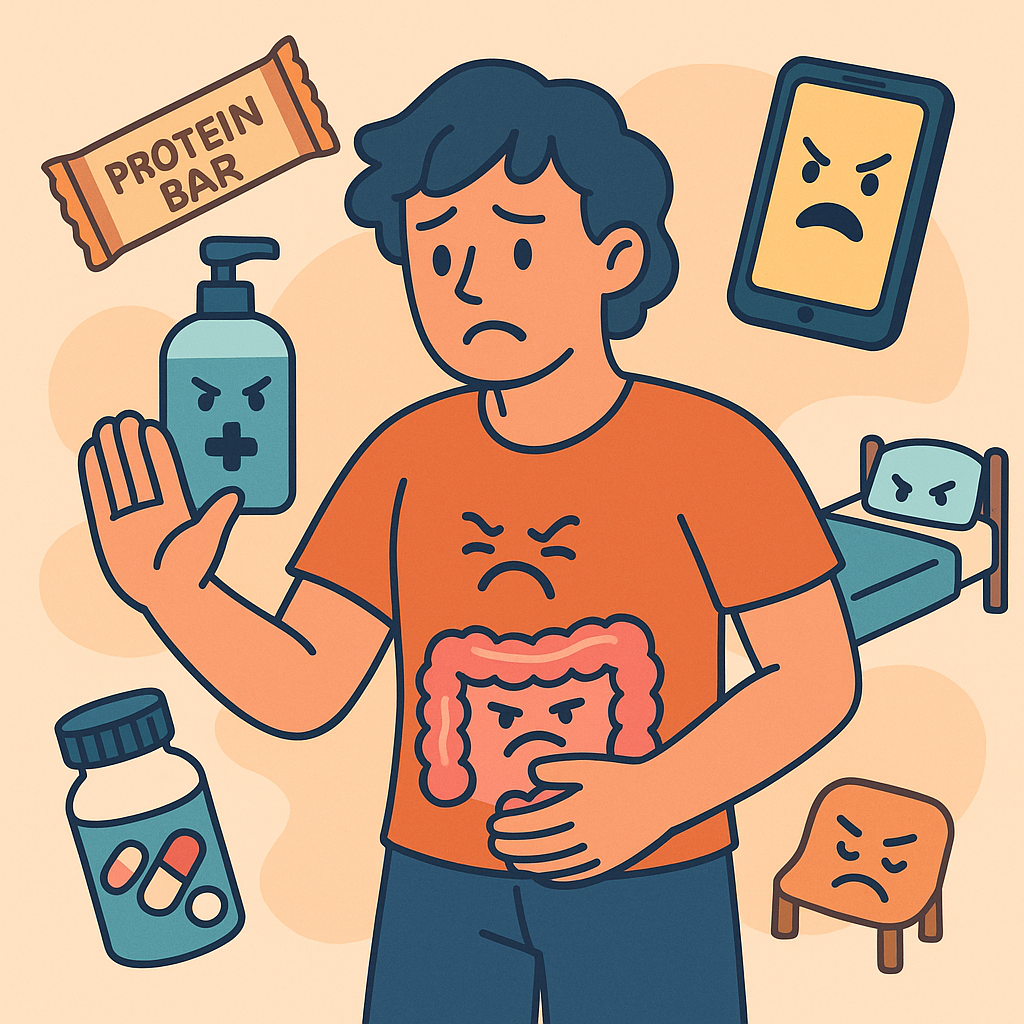So you think you’re gut-savvy. You eat your Greek yogurt, buy gluten-free everything, and once lit a candle during meditation. But your digestion still feels like a rollercoaster, and your gut? Not impressed.
Turns out, a lot of “healthy” habits are gut saboteurs in disguise. Here are 10 common mistakes you’re probably making, why they wreck your digestion, and what to do instead—without spiraling into kombucha-fueled panic.
🧃 1. “Healthy” Ultra-Processed Foods Are Still Ultra-Processed
Protein bars, low-carb wraps, gluten-free cookies… they wear a health halo, but under the hood? They’re often packed with gut-disrupting emulsifiers (like polysorbate-80 and carboxymethylcellulose), artificial fibers, and preservatives.
These ingredients can:
- Damage your intestinal lining
- Feed the wrong bacteria
- Trigger bloating and inflammation
Fix it:
Swap for whole foods with real ingredients. Think: actual fruit, plain Greek yogurt, nuts, hard-boiled eggs, or leftover roast chicken. If the ingredient list looks like a chemistry exam, your gut wants a divorce.
🦷 2. You’re Not Chewing. You’re Inhaling.
Digestion starts in the mouth. If you’re chewing each bite twice before swallowing like a snake unhinging its jaw, your stomach is left playing catch-up. This leads to gas, bloating, and partially digested regret.
Fix it:
Chew each bite 15–20 times. Yes, it feels weird. Yes, it works. It gives your digestive enzymes time to prep the gut party and reduces the load on your intestines. Bonus: you’ll feel fuller, faster.
📱 3. Doomscrolling = Gut Distress
Cortisol—the “stress hormone”—is like bleach for your microbiome. Nighttime scrolling raises cortisol, which can:
- Weaken your gut lining
- Worsen acid reflux
- Spike inflammation
Fix it:
Build a gut-friendly bedtime ritual. Try reading a book (paper, not Kindle), light stretching, or journaling about something other than how the world is doomed. Bonus points for getting off screens 60 minutes before bed.
💊 4. Antibiotics in Your Food (Yep, Really)
Antibiotics don’t just come in pill form. They also sneak into your gut via non-organic meat, poultry, and dairy, where they wreak havoc on your gut flora. Over time, this weakens your defenses and leads to dysbiosis—when bad bacteria outnumber the good guys.
Fix it:
Look for labels like “antibiotic-free,” “organic,” or “pasture-raised.” And after any prescribed antibiotic? Ask your doc about probiotics or fermented foods to repopulate your microbiome. (Not medical advice, but your yogurt probably agrees.)
🍭 5. Artificial Sweeteners = Microbial Mayhem
Think you’re being clever with your zero-calorie soda? Your microbiome thinks otherwise. Sweeteners like aspartame, sucralose, and saccharin have been shown to:
- Alter gut bacteria balance
- Impair glucose metabolism
- Increase cravings (rude)
Fix it:
Stick with natural alternatives like stevia, monk fruit, or just plain water with lemon. Or, wild idea: retrain your taste buds to enjoy things without an IV drip of sweetness.
⏰ 6. Intermittent Fasting… With a Side of Chaos
Intermittent fasting isn’t evil—but if you’re doing it while stressed, underslept, and skipping nutrients, your gut may start a rebellion. Long fasts can reduce gut motility, cause constipation, and spike cortisol.
Fix it:
Make fasting flexible. Listen to your body. If your stomach feels like it’s eating itself by 10 AM, break your fast with something gentle like eggs, berries, or oatmeal. This isn’t a cult. You’re allowed to eat.
🧼 7. Living in a Hand Sanitizer Bubble
We love cleanliness—but sterile environments starve your microbiome. You need exposure to natural microbes to maintain gut diversity, immunity, and sanity.
Fix it:
Touch some grass. Pet a dog. Get dirt under your nails. Live a little. And for the love of microbes, stop bathing in Purell unless absolutely necessary.
😴 8. Crappy Sleep = Crappy Gut
Your gut has its own circadian rhythm. Poor sleep messes with digestion, hormones, and microbial balance. Chronic night owl syndrome is a one-way ticket to leaky gut, bloat, and bad moods.
Fix it:
Treat sleep like your job. Set a consistent bedtime, reduce blue light, and try magnesium or chamomile tea if you need help winding down. Trust us: your gut loves boring nighttime routines.
🚽 9. You’re Ignoring Your Poop (Don’t Act Brand New)
Poop is your body’s progress report. If you’re not looking, you’re missing out on data. Stool that’s too hard, too loose, or weirdly colored? That’s your gut waving a tiny flag saying, “Help me, I’m weird!”
Fix it:
Check your poop. Use the Bristol Stool Chart (yes, it’s a real thing). A healthy #4 is smooth and sausage-like. Anything else? You may need more water, fiber, or a life coach.
😤 10. Being Chronically Pissed Off
You thought stress was just a mental thing? Nope. Chronic anger, resentment, and general doom-mode increase inflammation, slow digestion, and wreck your gut-brain connection.
Fix it:
Start small: Breathwork, mindfulness, screaming into a pillow (seriously), therapy, or journaling. Let the rage out in healthy ways before your gut becomes collateral damage.
🧠 Final Thoughts: Your Gut’s Not Mad—Just Disappointed
Gut health isn’t about perfection. You don’t need to live in a fermented cave eating wild herbs and whispering to kombucha scobies.
It’s about making better daily choices that support your microbial metropolis—and avoiding sneaky habits that send it into chaos.
So chew more, stress less, and please—check your poop.
⚠️ Disclaimer: This article is for informational and entertainment purposes only. It is not medical advice. Consult a qualified healthcare professional before making any changes to your diet, medication, or lifestyle. Especially before throwing away your entire pantry.

Alex Keane is a health writer and gut health researcher with a personal mission: help people stop feeling like garbage for no clear reason. After years of dealing with brain fog, digestive issues, and 3am anxiety spirals, Alex started digging into the connection between the gut and the mind — and never looked back.
When not writing about microbiomes, Alex is usually found experimenting with fermented foods, walking obsessively, or trying not to buy more supplements off Instagram.
Alex is not a doctor, and that’s probably for the best.

